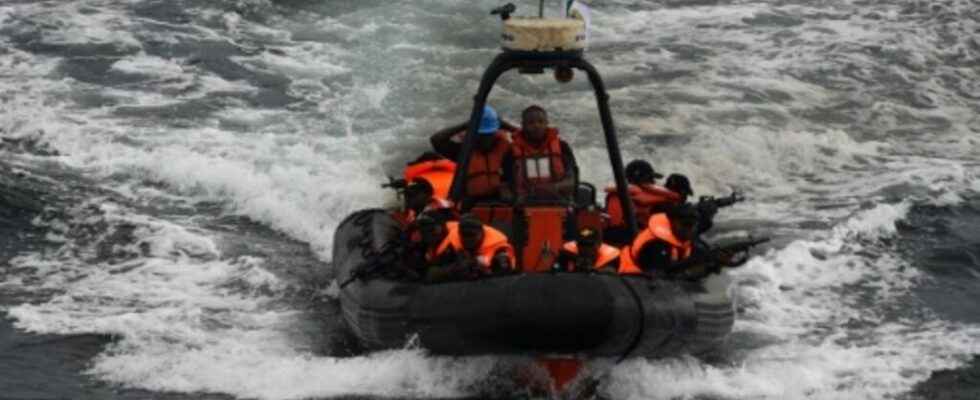In the history of piracy, this is a first! Ship attacks, thefts, hostage taking, the number of maritime crimes has never been so low. This is what the latest report from the maritime authorities of the MICA Center reveals. This research center based in Brest in the west of France has been recording crime at sea since the 2000s. Explanations with Jean-Philippe Casanova, general delegate of the Shipowners of France.
RFI: This drop in the number of hacks in 2022 is historic, so you confirm the data from the MICA Center in Brest?
Jean-Philippe Casanova : Yes, by the way, the International Maritime Bureau in Malaysia records the same trend. Since the statistics have been available in 2008, our crews at Armateurs de France, like all freight carriers, are pleased with this reduction.
RFI: Good news especially for the African coasts considered very perilous?
Sailors fear crossings in the Gulf of Guinea off Nigeria. We have about 190 vessels operating in those waters. A large part is reserved for services for off-shore oil or wind platforms.
RFI: What is an act of piracy?
It is an attack that takes place in international waters on the high seas. These attacks cripple a ship or take control of it. Several kinds of crimes are possible, theft or the taking of the crew hostage followed by ransom demands.
RFI: When we say pirate, we still imagine the attackers with the black flag with the skull inscribed on it. How to define the pirate of the seas today?
They are criminals who travel on zodiacs or very fast boats. They arrive on the boats with weapons and who hold back the occupants by force and loot the goods.
RFI: What is behind this historic decrease? Better water monitoring?
First to a global awareness of the maritime sector! A political awareness, of the various governments and also of the industry and the shipping companies.
RFI: How do you protect yourself against pirate attacks?
First, I would like to emphasize the crucial role of international cooperation. Thanks to this information exchange work, we know when ships at risk (marine cables, oil, etc.) are circulating in a perilous passage and could be attacked. That way, we know the corridors to avoid.
RFI: Protective barbed wire, drones, all kinds of modern means are available to crews?
The equipment of the ships has improved even if they do not protect everything. For example, some boats have small rooms where crews can take refuge in the event of an attack.
RFI: Why do you insist on the cruising speed of ships?
The best instruction to avoid being attacked is to make boarding difficult for the attackers! So to go fast without stopping or slowing down!
RFI: Over the past ten years, we have seen the resurgence of cyberattacks. Pirates hide behind their computers… Seizing a ship’s computer system remotely rather than at sea has contributed to a drop in the number of hostage-takings or attacks at sea?
The manufacturers we work with are all aware of cybercrime. Training exists and is applied. But I cannot make direct links with the drop in piracy in the Gulf of Guinea.
RFI: French sailors are training Asian crews in piracy, particularly in Singapore (an area of high maritime economic traffic.) Attacks in territorial waters are on the rise there. Now that container carriers have found their way back to China, are you worried about the Asian seas?
I don’t know if Asian territorial waters will become at risk like those off Africa, but it is necessary for all our crews to be informed and trained. Let’s not forget that the crews are first and foremost women and men, with families and colleagues. They need to be protected before even talking about attempts to steal goods.
RFI: What are the most attacked boats today?
Unfortunately I would say that everything that is transportable is attackable! Burglary at sea! Cables, convoys of computers, foodstuffs, raw materials… In reality you find at sea what organized gangs do on land on trains, trucks or warehouses.
RFI: Precisely this fall in attacks at sea would also be due to a postponement of thefts, in particular of illegal oil refining which would be on the rise on land, notes the University of Copenhagen in Denmark.
We see everything in terms of crime and developments are possible. What I record myself is the sometimes presence of small boats used to attack smaller boats and not on the high seas, but very close to the coast.
RFI: In the event of a crew being taken hostage, what do you do?
The instruction is to immediately contact the national authorities. It is then up to the political and military leaders to make the appropriate decisions.
RFI: You were yourself a ship’s pilot. Have you ever been attacked or taken hostage?
Never ! Fortunately ! I sailed for 10 years. I transported passengers and containers of goods, computers, bananas and other fruits when I was in the West Indies… But I have fellow sailors who have been attacked. A phenomenon in decline but in the face of which we must always be vigilant!
